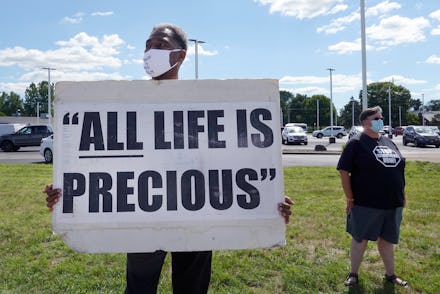The federal government just executed an inmate for the first time in 17 years

Early Tuesday morning, the Department of Justice carried out the first federal execution in nearly 20 years. The execution of 47-year-old Daniel Lewis Lee, who was convicted of killing a family of three in 1996, follows an overnight Supreme Court decision that ruled the death penalty constitutional.
Lee was pronounced dead by lethal injection around 8 a.m. Tuesday by the Bureau of Prisons. He died at the federal prison in Terre Haute, Indiana, where he spent 20 years on death row.
"Over the four hours it took for this reckless and relentless government to pursue these ends, Daniel Lewis Lee remained strapped to a gurney," said Ruth Friedman, Lee's lawyer. "A mere 31 minutes after a court of appeals lifted the last impediment to his execution at the federal government's urging, while multiple motions remained pending, and without notice to counsel, he was executed."
Up until his execution, Lee maintained his innocence, saying that he had not been present when the two parents and their 8-year-old daughter were killed. Prosecutors were pressured by the Justice Department in 1999 to pursue the death penalty against Lee, who was a white supremacist and has since denounced his participation in the racist organization, the Aryan Peoples' Republic.
"I didn't do it. I've made a lot of mistakes in my life but I'm not a murderer," Lee said, according to NPR. Lee was constrained to a gurney for nearly four hours before his execution, just before which he said, "You're killing an innocent man."
Last year, Attorney General William Barr announced that the Justice Department would pursue federal executions for the first time in 20 years. Since that time, a team of lawyers worked for a court order to stay Lee's execution. On Monday, a federal judge halted the execution, only to be overruled by the Supreme Court in the early morning hours Tuesday.
Lee's execution has reignited a national debate about the efficacy of the death penalty and the morality of the federal government intentionally killing someone during a global pandemic. Experts and advocates say that the death penalty is outdated, unconstitutional, and racist, and point to an estimate that 1 in 25 people on death row are innocent. The Equal Justice Initiative, which works to get people off of death row, says that the country's use of the death penalty is connected to its history of lynching Black people.
Using the death penalty as punishment for what the Justice Department believes to be the most heinous crimes — premeditated murder and rape — is controversial even among some families of victims. In a New York Times article from last year, Earlene Branch Peterson, the mother and grandmother of two of Lee's victims, said, "I believe putting Daniel Lee to death is not the answer. It’s an easy way out. He should have to live through this. Like I did."
Despite Peterson's feelings toward Lee, Barr maintained that the execution was aligned with the values and will of the American public. In a statement, Barr said, "Today, Lee finally faced the justice he deserved. The American people have made the considered choice to permit capital punishment for the most egregious federal crimes, and justice was done today in implementing the sentence for Lee’s horrific offenses."
Barr is correct that a majority of Americans — 56% in a 2019 Gallup poll — are in favor of the death penalty. However, favorability remains highest among older, white men, while younger people, women, and people of color tend to disapprove. Use of the death penalty is actually decreasing, with many states passing legislation to ban the killings at the state level.
Even the Supreme Court doubted the use of the death penalty and has waffled on when it should be used. In 1972, the justices banned state-sanctioned executions at both the federal and state level. In 1988, Congress reinstated the executions, and the Supreme Court upheld this move. Later, in 2005, the court ruled that people younger than 18 couldn't be sentenced to the death penalty. At the time, Justice Anthony Kennedy wrote, "When a juvenile commits a heinous crime, the state can exact forfeiture of some of the most basic liberties, but the state cannot extinguish his life and his potential to attain a mature understanding of his own humanity."